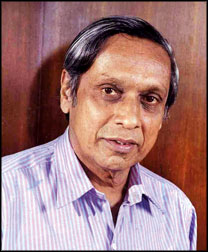Internal governance of the universities in Sri Lanka
Text of speech delivered by Higher Education Minister Prof. Wiswa
Warnapala at Conference of Vice Chancellors in Wadduwa on August 28.
When the Medieval University came into existence, its over-lord was
the Bishop of the diocese in which it was located as the University of
the period was integrally linked to the Church.
 |
|
Minister
Prof. Wiswa Warnapala |
Both Oxford and Cambridge had similar beginnings and it was on the
basis of this tradition that Cardinal Newman expounded most of his ideas
which later came to be incorporated in his celebrated work - ‘The Idea
of a University’ published in 1858. In the middle ages, it was to the
papal authority that the University scholars looked for patronage and
privileges.
Intelligent men
The University was, as its very name implies, was a community of
scholars who, as intelligent men, were not prepared to be subservient to
authority. The medieval society, on the other hand, was authoritarian by
nature. The University scholars, from the very start, were aware of the
need to protect their rights and regulate their own affairs.
The University scholars, from this period onwards, wanted to have
their say in the conduct of their own business. It was on the basis of
this tradition that the administrative systems of the Universities
evolved, and even during the midieval times, the Chancellor took
precedence over others, and he, in his own personal capacity, was the
head of the University.
A bridge
Originally he had been a religious official, but soon he became chief
official of the University; he, in fact, was the bridge between the
University and the Church and he enjoyed judicial power over his
subordinates.
It came to be realized that a busy Bishop, because of his varied
interests in the church, could only exercise cursory supervision, and as
a result Chancellor’s duties were gradually taken over by a deputy, whom
he appointed and later came to be known as the Vice Chancellor.
The Universities of the period, like other medieval guilds and
similar institutions, were hierarchical in organization, and the most
effective executive meeting of the University was the Convocation,
consisting of both the teaching and administrative personnel of the
University.
It was a kind of a Congregation, and it was from this concept that
the Court of the University, which we practised in Sri Lanka when the
University system was unitary in character, came into existence. It was
the final court of appeal and the supreme governing body of the
University, and it had the power to make permanent statutes on both
academic and administrative matters.
A different meaning
The different faculties had an opportunity to consider matters
individually before they were sent to the Convocation, which today has a
different meaning attached to it.
This was the nature of the institutions of the University in the 16th
Century, and until 1854, there were no changes in this form of
organization; it remained cumbersome and outmoded. The reformers of the
mid-19th Century were so eager to change the oligarchical character of
the institution.
Since the system of administration was wholly midieval in character
and organization, the Frank Report, which examined Oxford, made a number
of significant recommendations for modifying the Universities’
governmental structure in the interest of greater administrative
efficiency. The Frank Commission, in fact, said that “we have no doubt
Oxford’s machinery of government needs radical revision”.
This report recommended that the Vice Chancellor no longer be chosen
only from among the heads of the colleges but selected from among the
members of the Congregation which, in effect, was similar to the
University Court of our system in the initial period of University
education in Sri Lanka.
Recommendations
The recommendations of this Report, in large measure, fell in line
with modern trends. It laid the foundation for the creation of an
academic and administrative oligarchy in the Universities.
The changes proposed aimed at administrative efficiency, and it was
to be achieved by blending the independent traditions with the needs of
the modern University. It needs to be stressed that a University cannot
be run as a business organization.
On the basis of this historical introduction, I would like to examine
certain aspects of University governance in Sri Lanka. The University of
Ceylon Ordinance, No. 20 of 1942 was more or less modelled on the
Oxbridge model and all institutions, both academic and administrative,
came to be built on the experience of these two Universities.
Sir Ivor Jennings, though gave a different interpretation to the
objectives of the Colonial University, wanted to establish a University
with the institutions of the British model; it was during this period
that the University administrators themselves wanted certain reforms
within their system based on ancient traditions.
In most modern Universities, the government is vested in the
University Court, a larger body, a majority of whom are not members of
the teaching staff of the University but eminent persons representing
different interests and groups.
What was needed was a good relationship with the representatives of
the State; in 1948 it was stated that “the truth of the matter is that
Universities have not yet learnt how to handle their new patron-the tax
payer, the man in the street, speaking through his representative in
Parliament”.
Autonomy
Ivor Jennings mentioned one technique for enlisting the understanding
of the new patron, he said that “there was a large measure of autonomy
in his University because the Government of Ceylon is given adequate
representation in the Court of the University. The presence of elected
members of Parliament in the Court enables those bodies to have adequate
information about University activities.
To be continued
|



